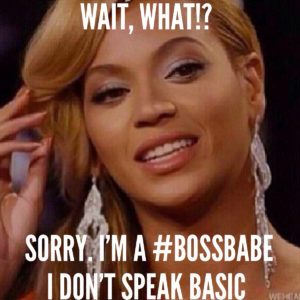A lot of the people around me – from a variety of age groups – seem to have a common complain: female bosses. From my aunt in Dubai who is 47-years-old and states that she would much rather pick having a female boss over a male one any day; to newly graduated friends of mine who live and work in the UK who call out female bosses for being vindictive and especially problematic; and finally to newly graduated friends of mine who live and intern in multi-national and international organizations corporations who share very similar opinions; it seems that the prospect of female bosses is a common cause of genuine complain.

It really seems that the common sentiment is the fact that they are “bad female bosses,” not simply “bad bosses.” In other words, it is the female part that seems to be where the problem lies and where the fingers are pointed, when it comes to this sentiment.
I think that there are a few things that need to be broken down, when it comes to this particular topic, and this article will attempt to do so in a fair and balanced manner.
Firstly, it is completely true that females in position of power are readily called and assumed to be vindictive b*tches before they even open their mouths, and speak. Sexist cultural norms love to place social sanctions on females that speak their mind in general, let alone females who are literal business bosses, and/or females who are leaders in their fields.
Women are not just neutrally seen as leaders, they are seen as too bossy, they are seen as too loud, they are seen as too everything, so much so in fact that whenever a woman is successful to the extent where no one could possible deny her success, that very success is attributed to her compromise of what has been historically seen as those female characteristics that have banned women from accessing positions of power in the first place.

She is successful because she has given up her emotions, and replaced it with reason, like a ‘man’ would. She is successful because she has abandoned maternity altogether, she is successful because she has children that she does not care to raise herself, like a ‘man’ would.
It seems, thus, that the words ‘successful’ and ‘woman’, and that the words ‘female’ and ‘boss’ have – according to sexist standards – such contrary meanings that in order for ‘successful’ and ‘boss’ to make sense, ‘feminine characteristics’ have to be somehow be tainted enough to register as ‘masculine’ for her success and leadership to make sense.
I completely agree that sexism has highly and disproportionately negatively influenced female bosses. There is a point , however, where my defense ceases to come to the rescue of some female bosses. This point is when a female boss is truly a b*tch. This is especially common since a recent articulation of feminism – especially present on social media – has sought to re-claim and re-define the term ‘b*tch’ in a manner that would allow the term to be seen in a positive light.
The movement is inspired by the importance of appropriating the sexist tools of social interaction – found prominently in linguistic communication – to over throw the aforementioned negative connotations behind female leadership. All of this is fine, but has it gone too far?
I have been hearing stories, narratives, and accounts – from both the UK and Dubai – of specifically female gendered bosses screaming at their employees in an unprofessional manner, and/or mistreating employees who may possess a different set of opinions on work – related matters, and/or wanting to establish hierarchies, boundaries, and chains of command in a very aggressive manner. All this is done under the genuine belief that this empowers them as women, and solidifies their status as bosses.
And guess what? No one can really complain about it because of this cult of political correctness. If you call a female boss aggressive or vindictive, it is always because you are sexist, and never because she may be just that.
Some may say, however, that female bosses may feel an increased pressure to prove themselves and be taken seriously by their employees because of their gender. While this may be true, the sexism card does not come to your rescue when you are flat out unprofessional.

I have met one of the world’s most renowned Virginia Woolf scholar, she was not a b*tch, she was a boss. I have met female business matriarchs, they were not b*tches, they were bosses. I have met one of the world most renowned Virginia Woolf scholar, she was not a b*tch, she was a boss. I have met female business matriarchs, they were not b*tches, they were bosses.
I have met female students who are likely going to be this epoch’s greatest thinkers, they were not b*tches, they were bosses. I have met single mothers who raised entire families on their very own, they were not b*tches, they were bosses.



